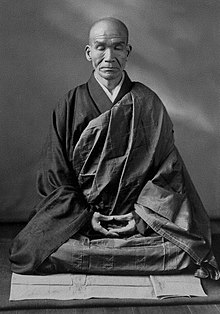You are currently logged-out. You can log-in or create an account to see more talks, save favorites, and more. more info
Zazen Talks

Zazen is a meditative discipline that is typically the primary practice of the Zen Buddhist tradition.
The generalized Japanese term for meditation is 瞑想 (meisō); however, zazen has been used informally to include all forms of seated Buddhist meditation. The term zuòchán can be found in early Chinese Buddhist sources, such as the Dhyāna sutras. For example, the famous translator Kumārajīva (344–413) translated a work termed Zuòchán sān mēi jīng (A Manual on the Samādhi of Sitting Meditation) and the Chinese Tiantai master Zhiyi (538–597 CE) wrote some very influential works on sitting meditation.
The meaning and method of zazen varies from school to school, but in general it is a quiet type of Buddhist meditation done in a sitting posture like the lotus position. The practice can be done with various methods, such as following the breath (anapanasati), mentally repeating a phrase (which could be a koan, a mantra, a huatou or nianfo) and a kind of open monitoring in which one is aware of whatever comes to our attention (sometimes called shikantaza or silent illumination). Repeating a huatou, a short meditation phrase, is a common method in Chinese Chan and Korean Seon. Meanwhile, nianfo, the practice of silently reciting the Buddha Amitabha's name, is common in the traditions influenced by Pure Land practice, and was also taught by Chan masters like Zongmi.
In the Japanese Buddhist Rinzai school, zazen is usually combined with the study of koans. The Japanese Sōtō school makes less or no use of koans, preferring an approach known as shikantaza where the mind has no object at all.
| Title | Speaker | |
|---|---|---|
Madhyamika and Mahayana - Zazenshin Intimacy, Zazen, Breath, Hindrances |
Apr 01 1991 13 |
|
Rohatsu Sangha, Zazen, Dogen |
Dec 1989 7 |
|
Awakening Through Compassionate Connection Commitment, Harmonizing, Zazen |
Aug 09 1989 Tassajara |
|
Relinquishing Self for True Awakening Bodhidharma, Zazen, Equanimity, Cultivation, Oneness |
Aug 07 1989 |
|
Awakening through Zen and Shakespeare Bodhidharma, Zazen, Equanimity, Cultivation, Oneness |
Aug 07 1989 |
|
Embracing Emptiness for True Awakening Bodhidharma, Blue Cliff Record, Zazen |
Aug 07 1989 Tassajara |
|
Buddhaland Realization Through Zazen Practices Practice Period, Zazen, Vow |
Jun 14 1989 |
|
Concepts Daily Life, Bodhidharma, Zazen |
Mar 12 1989 Green Gulch Farm |
|
Confession and Repentance Confession-and-Repentance, Repentance, Three Treasures, Zazen |
Feb 25 1989 Tassajara |
|
Interconnectedness Through Zazen Practice Repentance, Zazen, Impermanence, Forgiveness, Practice Period |
Jan 20 1989 Tassajara |
|
Awakening in Stillness: Zen's Non-Dual Path Manjushri, Zazen, Perfect Wisdom |
1989 |
|
Blissful Harmony Through Meditative Emptiness Emptiness, Meditation, Zazen |
Jul 14 1988 |
|
Embrace the Uncontrollable Flow Zazen, Skandhas, confusion |
Jun 05 1988 |
|
Embracing Oneness Through Meditation Oneness, Buddha Nature, Intimacy, Zazen |
Feb 21 1988 |
|
Cauldron of Zen: Embrace Fate Zazen, Anger, Oneness |
Feb 14 1988 |
|
Intimate Pathways in Zen Practice Intimacy, Practice Period, Zazen |
Feb 10 1988 Tassajara |
|
Embodied Wisdom Beyond Comprehension Stillness, Zazen, Wisdom |
Mar 22 1987 |
|
Rebirth Through Humility and Meditation Breath, Gratitude, Oneness, Zazen |
Mar 16 1987 |
|
Illuminating Paths: Zen's Infinite Dance Enlightenment, Nirvana, Zazen |
Dec 12 1986 |
|
Zen's Silent Symphony: Beyond Words Breath, Zazen, Pain |
Dec 11 1986 |
|
Blossoms of Zazen Insight Practice, Zazen, Time |
Dec 10 1986 |
|
Unthinking Zen: Experiential Paradox Peace, Zazen, Time |
Jul 02 1985 |
|
Transcending Thought: The Zen Poem Journey Zazen, Intimacy, Buddhism |
Jul 01 1985 |
|
Manifesting Zen Beyond Thought Soto Zen, Instruction, Zazen |
Jun 30 1985 |
|
Compassion Composure, Zazen, Observe, Transmission, Balance |
Aug 17 1983 1 of 2 Tassajara |
|
Tranquility and Insight: Timeless Harmony Zazen, Buddhism, Meditation |
Aug 17 1983 |
|
Embrace Life's Lightness With Zen Evil, Zazen, Time |
|
|
Path to Peace: Embrace Emptiness Practice, Work, Zazen |
Sep 28 |
|
Living Zazen: Moment-to-Moment Presence Zazen, Precepts, Time |
May 14 |